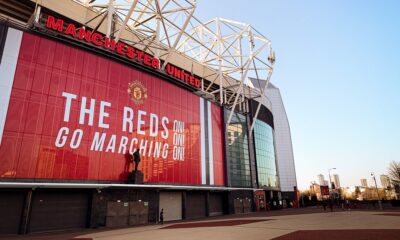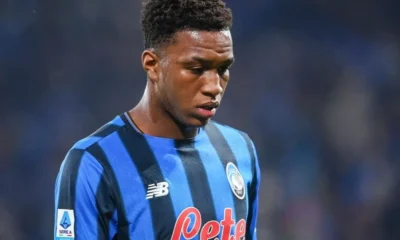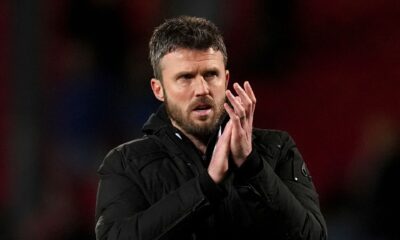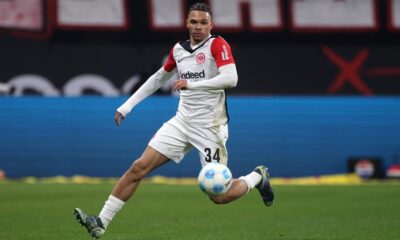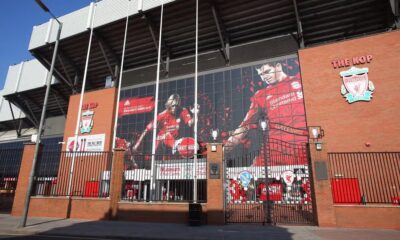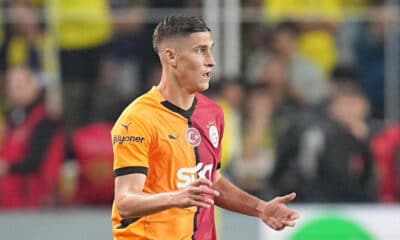Liverpool
“Working hard, doing the right things” – An assessment of Rafa’s reign as Matador of Merseyside

By Phil Dickinson.
As a Liverpool fan, I had a strange sense of déjà vu last week. 6 summers ago Gérard Houllier departed Anfield after a 6 year tenure at the club and there were a mixture of emotions in the air.
I remember being pleased, excited by the prospect of a fresh start. A fifth place finish in 2003 felt like a huge step backwards after finishing second to Arsenal the previous year. Houllier’s decision to let Nicolas Anelka and Finish veteran Jari Litmanen go in favour of 10 million pound El Hadji Diouf left many of us questioning the Frenchman’s judgement.
But there was a sense of sadness too. Houllier had brought us some memorable times, including a treble season packed with all the twists, turns and surprises we’ve come to expect from Britain’s most successful football club. And above all, Houllier was a gent, maybe, unlike Rafa Benitez, too polite and magnanimous for his own good.
And here we are again in 2010. On the brink of title No. 19 one summer, without Champions League football the next. Although, some Liverpool fans expressed anger at Benitez’s sacking last week, a section of fans even responding by burning US flags outside the famous Paisely Gates, I personally had the same mixture of emotions I experienced 6 summers ago: relief, excitement, sadness, nostalgia.
I would compare it to taking off a slightly uncomfortable pair of shoes, a pair of shoes that always looked the part and everyone told you were a great brand, but were never quite the perfect fit and gave you the occasional blister. In the end, it pains you to throw them out because you’ve worn them for so long, but you know it’s time for something more “fit for purpose”.
Some Liverpool fans, in keeping with their burning hatred for the club’s American owners, have painted Benitez’s sacking as a sort of coup. Benitez has apparently been forced out by people who are trying to destroy the club from the inside. Purslow is to blame, Parry is to blame, Moores is to blame, Broughton is to blame. These men have apparently not just made personal errors of judgement or had sporadic conflicts with Benitez, but are actually joining the Americans in some sort of plan to rip the heart out of the club. After following this media driven story for so long now, looking at the spin that some fans are putting on this saga, I wonder if there are any good guys left at this great club anymore.
We all want to see the back of Gillett and Hicks and we all back the campaign to drive them out, but the existence of conspiracy theories involving just about every eminent figure at the club, past and present, doesn’t help the situation.
People forget that football people are human beings; they naturally have rifts and disagreements. But those disagreements, filtered through the voice of the mainstream media as they are, don’t necessarily prove that one party is out to completely undermine and destroy.
I, like those who had the power to end Benitez’s reign at the club, believe that it was time for a change at management level. I don’t see it as being suspicious or the next stage in the deliberate and calculated destruction of the club. In the end, Benitez’s reign, for whatever reason, just ran out of gas. As the old saying goes, a change is as good as a rest.
But just because I agree with his sacking doesn’t mean I don’t appreciate what Benitez has done for Liverpool Football Club. I’ll remember Benitez for his strengths as well as his weaknesses and for the highs as well as the lows.
His strengths are fairly obvious to all. He is a meticulous planner and works hard to make sure his players know what their jobs are. And when his players forget their jobs, he’s the first out of his seat to remind them where he wants them to be. I always liked that about him. It proved there was a passion burning inside him.
In his first few seasons he built up a reputation for being a difficult man to please. A crucial goal rarely brought out a celebration or even a smile in him. To me, that always showed his standards were high. Like Shanks, he wouldn’t be satisfied until the trophy was won and that is the Liverpool way.
He was also hailed as a tactical genius when he arrived at Anfield. That, on reflection, was maybe pushing it a bit. But Rafa knows how he prefers to play and his sides, whatever the personnel, are rarely easy to play against. In fact, his “clockwork”, counter-attacking tactical system was perfect for European knock out football. Fellow European giants found us a pain to play in their own stadium and still rightly feared the white-hot Anfield atmosphere. Once The Reds had nervously squeezed through the group stages, they were a match for absolutely anyone over 2 legs.
But European success did paper over some of the domestic cracks. Benitez never quite appreciated that the Premier League was a very different and unique competition where, for sides that want to be Champions, fortune favours the brave. Benitez’s sides were never quite bold enough, often struggling to impose their superior quality in games away from home, sometimes failing narrowly to break down sides who parked the proverbial bus in front of The Kop.
During the 2007-2008 season, I constantly battled against the common assertion of the time that Manchester United’s squad was “head and shoulders above” Liverpool’s. By that season, the spine of Liverpool’s squad, in Reina, Carragher, Mascherano, Gerrard and Torres, was as good as any team in the league. I always argued that although United’s strength-in-depth was better, it was Ferguson’s ability to get the most out of his more average players that made them a model of consistency.
The squad itself steadily improved in terms of quality and balance over the years, but often a failure to see off teams had people criticising Bentiez’s transfer dealings rather than the deficiencies of the manager’s system. For me, the reluctance of Benitez to let his side completely off the leash in the Premier League was always more of a problem than the quality of players at his disposal.
The 2008-2009 season, where Liverpool managed to push Manchester United all the way for the title, does remain something of an anomaly. Many will say that that season alone proved Rafa had it in him to bring home No. 19. But even that campaign, it was an inability to break down teams like Fulham, West Ham and Stoke City at Anfield that cost the Spaniard. Liverpool did turn many potential defeats into wins that season, they were only defeated twice all campaign, but it was an inability to turn draws into wins that was the difference first and second.
Steven Gerrard has talked about how he saw Gérard Houllier as a sort of father figure while he was at Anfield and it is fairly obvious that Benitez’s overall management style was very different to that.
Benitez was more the professional, single-minded disciplinarian. He wanted the players to know who was boss and, for that reason, emotionally kept his distance. That style of management has proved it can be successful in the past, but at crucial moments certain players clearly needed more careful man management; an arm around their shoulder, a calculated confidence boost or even just a one-on-one explanation about a certain decision. Players who it would have made financial sense to keep, like Peter Crouch or Craig Bellamy, were forced to move on because they either didn’t feel appreciated or were not managed sensitively enough.
By the time the Barry saga was over and Liverpool were left without Villa’s captain and talismanic midfielder, Xabi Alonso, there were some glaring holes in Benitez’s squad. Benitez’s counter-attacking side were never quite the same without Alonso, but it was the lack of strikers that really concerned Reds fans.
Benitez’s preference for playing Gerrard in behind Torres had led to many strikers, including the overpriced Irishman, Robbie Keane, disconsolately warming the bench. Rafa clearly found it difficult to keep Torres’ potential strike partners happy and, in the end, when Torres picked up injuries, inexperienced Frenchman, David Ngog was the only man left. By spending his transfer kitty on Glen Johnson and Alberto Aquilani, Benitez really did take one almighty gamble on the fitness of Fernando Torres. In the end, it didn’t pay off. A lot of people saw the lack of strikers as a financial problem. Personally, I always saw it as more of a man management one.
And while it appears that Benitez was never that emotionally involved with his players, it is even more obvious that he didn’t give much away to the media. Initially, that was probably more to do with the language barrier. In his first season, every post-match interview was just the repeated mantra of “we try to work hard, we do the right things”. But we naturally didn’t hold it against him. It was to be expected.
But later on, even when his English was much better, Benitez was relentlessly defensive and gave little hint of the kinds of things he was saying to his players behind the scenes. It was always about “focusing on the next game”. In many ways, that was testament to his professionalism. Keeping everything in house took some of the pressure of his players.
However, during his ill-fated final season, when the wheels seemed to be falling off and the fans felt as low as they have felt in years, some of us would have appreciated a bit more openness and honesty. His post-match interview with Sky after the away defeat to Wigan was one of the rare times when we saw some magnanimous frankness from the Spaniard. In the end, it took Benitez some time to admit to us all that he had “made some mistakes”.
Benitez never quite hit it off with the British media. Benitez’s occasional displays of arrogance and bullishness never showed the level of charisma that made José Mourinho the media darling. Benitez had a great deal of personality and he got the better of Chelsea’s Portuguese whirlwind on a number of occasions, but journalists always preferred creating a good story out of the ‘Special One’.
Whereas Mourinho played up to the persona the media created for him, Benitez sometimes gave the impression that he didn’t trust journalists or didn’t want to play their game. That, in itself, is probably in keeping with the Liverpool way and, up until the final six months of his reign, that probably strengthened his position amongst the fans.
Naturally, the majority of the most painful memories I will hold of Rafa Benitez’s tenure with be those of the season just gone. The early season defeats to Spurs and at home to Aston Villa were particularly difficult to take, as our supposedly title chasing side registered as many defeats in the first month of that season as they had registered in the whole of the previous season. They were painful defeats because, even at that early stage, something didn’t look right. High expectations were swiftly crushed.
Although Liverpool fans were still desperate for some Premier League success, it was the home Champions League defeat to Lyon which gave a truer indication of just how badly things were going. Straight off the back of the infamous “beach ball incident” at The Stadium Of Light, Delgado’s injury time winner, sealing an inexplicable 20 minute collapse, was utterly excruciating. Exiting at the group stage was so uncharacteristic of Liverpool under Benitez, which made it all the more difficult.
There were difficult moments in other seasons too though. The Champions League exit to Benfica in 2006, Traore’s “Cruyff turn” into his own net against Burnley in early 2005, the FA Cup defeat to Barnsley in February 2008 and, of course, the Champions League final reverse in Athens the year before.
However, there were plenty of good times under Benitez. The FA Cup semi final victory against Chelsea at Old Trafford in 2006, followed by possibly the greatest final in the competition’s history, the 2-1 win at the Nou Camp in 2007, the 4-1 demolition of Arsenal complete with Peter Crouch hatrick only a month later, the 5-0 aggregate win against Real Madrid in 2009, and battling back from 1-0 down to destroy Manchester United 4-1 in their own backyard only 4 days after the home leg against Real.
But Benitez wrote himself into footballing folklore in his very first season at Liverpool. What absolutely nobody can take away from him is the fact that he was in charge of a side that achieved the impossible in 2005. What happened in Istanbul will be talked about, not just by Liverpool fans, but by all football fans for many decades to come. It will surely remain the finest night in the club’s history for many decades to come. I was there in the city for the homecoming parade and those amazing scenes will live with me forever.
However, the events of that night in Istanbul were a glorious culmination, the ultimate expression of a “never say die” attitude which The Reds carried throughout the tournament. Gerrard’s last gasp goal at Olympiakos, the first half blitz against Juventus, the epic, nail-biting battles with Chelsea in the semi-final; it was a near perfect display of belief and desire, a fairytale way to win Europe’s premier competition.
Houllier sealed whatever favourable reputation he now has on Merseyside in one season by winning 3 major trophies in 2001. Benitez took that a step further in 2005.
If media reports are to be believed, Rafa will soon take over at treble winning, Inter Milan, and I think he’ll do well in Italy. His tactical style will probably better suit Serie A and the Italian media will prefer his more reserved, professional persona in comparison to Mourinho.
I, for one, remain at the very least respectful of Rafael Benitez. We all wish him well. For the good times we thank him. There can be no doubt he gave it his all and, for that reason alone, he’ll never walk alone.



